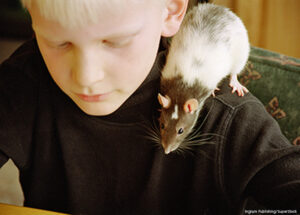
Too Many Landmines? Rats!

A landmine is an explosive device that is buried just under the surface of the ground and activated when someone steps on or drives over it. They are often used in war. More than 40 years after the Vietnam War, the Cambodian government estimates that there are approximately 4-to-6-million landmines still buried in their country. Beyond the risk to humans–dozens of people are killed or injured by the landmines every year–land known to contain mines cannot be used to farm or build.
A nonprofit called Apopo is working to come up with a solution to this problem. Apopo is a organization in Belgium that trains African giant pouched rats to aid in the removal of landmines in Cambodia. The rats, referred to as Mine Detection Rats (MDRs), have terrible eyesight but an excellent sense of smell. They can detect the presence of TNT in the ground and are trained through positive reinforcement. The rats have an advantage over mine-sniffing dogs because it is relatively inexpensive to breed, train, and maintain them. The rats are also too light to accidentally trigger the mines. Each rat can clear up to 239-square-yards in a half-hour.
Dig Deeper According the Red Cross, there are at least 78 countries that contain “post conflict” landmines. Do some research and find out what other efforts are being deployed to help remove them.
Beijing to Host 2022 Winter Olympics
In order to be considered as a host for the Olympic games, a country must participate in a bid against other interested countries. Organized by the International Olympic Committee, the process begins seven years in advance. In the past, competition has been fierce, as the Olympics might add a considerable boost to the host nation’s economy. However, growing financial concerns (it can be very expensive to build and maintain the facilities necessary to accommodate the Olympics) has lowered this number of countries willing to compete. This year, several cities (including Stockholm, Krakow and Oslo) dropped out of consideration.
That left two remaining cities competing for consideration–Almaty, Kazakhstan and Beijing, China. While Almaty was the more obvious geographic choice to host the Winter Games (with its ample snow and mountainous landscape), the bid went to Beijing (which gets roughly two inches of snow a year). But organizers can point to the most recent Winter Games, in Sochi, Russia, that manufactured seemingly endless mounds of artificial snow. Criticism of the IOC’s selection of Beijing extends beyond the environmental concerns. An estimated 1,500 people will be forced from their homes to build the Olympic village and a ski jump. Others point to China’s longstanding poor human rights record.
Dig Deeper Beijing hosted the 2008 Summer Games. Do some research and determine what lessons have been learned (if any) and will be applied to the 2022 games.
Political Fundraising Scorecard
It takes a lot of money to run for president. A lot. “Hard dollars” are controlled directly by the campaign and used to hire staff, maintain an office and travel expenses for the candidate. These contributions are regulated by the Federal Elections Commission (FEC), and make sure all candidates follow the laws regarding how (and how much) money is raised and spent. “Soft dollars” is money that is raised by an outside group affiliated with a particular candidate. These are Political Action Committees (PACs). This money is not regulated but has its own rules regarding how it can be spent.
Among the current crop of presidential hopefuls, Hillary Clinton (D), Mario Rubio (R), and Jeb Bush (R) rank among the top in terms of both money raised and money spent. A large percentage of the money in these campaigns is from their PACs. Conversely, Democrat candidate Bernie Sanders has raised all of his money through his campaign (hard dollars), with a reported 76 percent coming to him in the form of donations under $200.
What Do You Think? How much do you think the ability to raise a lot of money matters in ultimately becoming president? Find evidence from previous elections that supports your answer.
Ebola Vaccine
Last summer, btw brought you ongoing news of the Ebola crisis that ravished West Africa, killing more than 11,200 people. At the start of the outbreak, in December of 2013, there were no effective preventative drugs. On March 23, 2015, the World Health Organization (WHO) funded a pilot phase of an experimental vaccination program called the rVSV-ZEBOV (and dubbed Ebola ca Suffit, translated as “Ebola, this is enough”). More than 7,600 people living in New Guinea were vaccinated. There have been no reported cases of Ebola in the participants, giving the clinical trial a 100 percent success rate. Researchers conducting the study used a “ringed vaccination” approach, which means that they targeted a cluster of individuals from the same geographical region with the same high risk of infection.
The Director-General of the WHO, Dr. Margaret Chan, called the rVSV a “game-changer.” This is because vaccine studies can typically take many years to develop and are not always as successful (recent trials for malaria and dengue fever were only partially effective). Despite positive results, more research is needed. The Guinean national regulatory authority and ethics review committee have agreed to approve a continuation of the trial.
